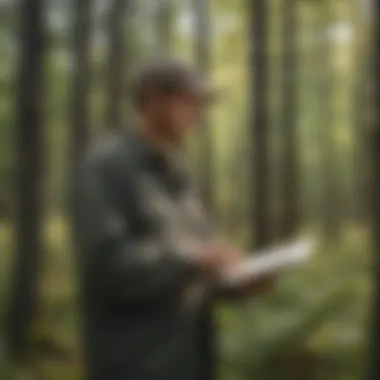Discover the Rich Wildlife Careers in Michigan: A Guide to Conservation Opportunities


Climate Change Impact on Evergreen Forests
Evergreen forests in Michigan, much like their counterparts across the globe, are facing the unprecedented challenges posed by climate change. One critical aspect of this impact is the role of evergreen forests in carbon sequestration. These majestic forests act as invaluable carbon sinks, absorbing and storing vast amounts of carbon dioxide, thus playing a vital role in mitigating climate change. Understanding the dynamics of carbon sequestration within evergreen forests is essential to grasp the full extent of their contribution to combating climate change.
Weather patterns within evergreen forests are intricately linked to climate change. As global temperatures rise, alterations in precipitation and temperature regimes can significantly impact these ecosystems. Changes in weather patterns can disrupt the delicate balance within evergreen forests, affecting growth rates, species composition, and overall ecosystem health. Staying abreast of these weather pattern effects is crucial in devising adaptive strategies to safeguard the resilience of evergreen forests against the impacts of climate change.
Moreover, the implications of climate change on biodiversity within evergreen forests are profound. As temperatures fluctuate and weather patterns shift, the delicate web of life within these ecosystems faces unprecedented challenges. From disruptions in food chains to habitat alterations, the effects of climate change reverberate throughout evergreen forests, underscoring the urgent need for comprehensive conservation measures to safeguard biodiversity and ecosystem integrity.
The localized effects of climate change on evergreen forests in Michigan are of paramount importance. By examining how regional climates are shifting and understanding the localized impacts on communities and ecosystems, stakeholders can better formulate targeted strategies to address the emerging challenges. Recognizing the unique vulnerabilities of specific regions within Michigan's evergreen forests is essential in crafting adaptive management approaches that not only mitigate the impacts of climate change but also foster resilience and sustainability within these critical ecosystems.
Introduction
In the vast realm of Michigan's wilderness, a multitude of unique opportunities beckon those interested in the realm of wildlife jobs. This introduction serves as a gateway to understanding the intricate tapestry of roles dedicated to preserving and managing the state's diverse ecosystems. By delving into this article, readers will uncover the importance, nuances, and exceptional benefits that come with pursuing wildlife careers in Michigan.
Overview of Wildlife Jobs
Importance of Wildlife Jobs
Wildlife jobs play a pivotal role in safeguarding the delicate balance of Michigan's natural habitats. The significance of these roles extends far beyond mere conservation; it embodies a commitment to nurturing biodiversity, mitigating human-wildlife conflicts, and ensuring the sustainability of precious natural resources. The allure of wildlife jobs lies in their direct impact on ecological preservation, making them not just a rewarding profession but a noble calling. Despite the challenges they may entail, the satisfaction of knowing one is contributing to the welfare of Michigan's fauna is immeasurable.
Scope in Michigan
Michigan's scope in the realm of wildlife jobs is expansive and diverse. From the dense forests of the Upper Peninsula to the sprawling wetlands of the Lower Peninsula, the state offers a varied landscape for individuals passionate about wildlife conservation. The state's unique geography provides a fertile ground for a wide array of wildlife species, creating opportunities for career growth and specialization. By choosing to pursue a wildlife position in Michigan, individuals can immerse themselves in a rich tapestry of ecosystems, each presenting its own set of challenges and rewards.
Woodsy
Web: Ensuring Forest and Wildlife Conservation
Description of Woodsy


Web
WoodsyWeb stands as a prominent advocate for forest and wildlife conservation in Michigan, bridging the gap between environmental stewardship and technology. This platform serves as a virtual hub for connecting conservationists, researchers, and wildlife enthusiasts, fostering collaborations aimed at preserving the state's natural heritage. Through innovative tools and resources, WoodsyWeb offers a dynamic platform for sharing knowledge, implementing conservation strategies, and raising awareness about critical environmental issues. Its comprehensive approach towards forest and wildlife conservation sets a benchmark for sustainable practices in the digital age.
Target Audience
The target audience of WoodsyWeb comprises a diverse group of stakeholders invested in the welfare of Michigan's forests and wildlife. From seasoned conservationists to budding environmentalists, this platform caters to individuals driven by a common goal: to protect and preserve the state's natural resources. By fostering a community of like-minded individuals, WoodsyWeb facilitates knowledge exchange, skill development, and collaborative initiatives that are indispensable for safeguarding Michigan's biodiversity. Its inclusive nature ensures that individuals from all walks of life can contribute meaningfully towards a shared vision of sustainable environmental stewardship.
Key Wildlife Jobs in Michigan
In the realm of wildlife conservation in Michigan, key wildlife jobs play a pivotal role in safeguarding the state's diverse ecosystems and wildlife populations. These roles encompass a range of responsibilities that are essential for the preservation and management of Michigan's natural habitats. Wildlife jobs not only contribute to the protection of endangered species but also aid in maintaining ecological balance, promoting biodiversity, and educating the public on environmental conservation efforts. The significance of these positions extends beyond individual responsibilities to embody a collective commitment to sustainability and environmental stewardship.
Wildlife Biologist
Responsibilities
Wildlife biologists are entrusted with the critical task of studying and monitoring animal behavior, habitats, and populations to assess environmental impact and formulate conservation strategies. Their primary responsibilities include conducting field research, analyzing data, and developing wildlife management plans. The role of a wildlife biologist is indispensable in understanding the interconnectedness of various species within an ecosystem and implementing measures to ensure their survival.
Skills Required
To excel as a wildlife biologist, individuals must possess a strong foundation in biology, ecology, and wildlife management. Key skills include proficiency in data analysis, research techniques, and strategic decision-making based on scientific findings. Attention to detail, patience in observing wildlife, and effective communication skills are prerequisites for this role, emphasizing the necessity of both scientific acumen and interpersonal abilities.
Salary Outlook
The salary outlook for wildlife biologists in Michigan reflects the specialized nature of the profession. Entry-level positions typically offer competitive salaries, with the potential for advancement based on experience and expertise. Additionally, professionals with advanced degrees or certifications may command higher salaries and access opportunities for leadership roles within wildlife conservation organizations.
Conservation Officer
Duties


Educational Pathways for Wildlife Careers
In this insightful section of the article, we delve into the crucial topic of Educational Pathways for Wildlife Careers, shedding light on the foundational aspects that aspiring professionals need to consider. Education plays a pivotal role in preparing individuals for rewarding roles in wildlife conservation and management. By exploring specific elements such as degree programs, internships, and specialized training, individuals can acquire the necessary knowledge and skills to excel in this field.
Bachelor's Degree Programs
Curriculum Overview
The Curriculum Overview of Bachelor's Degree Programs in wildlife studies is paramount for aspiring conservationists. This comprehensive program equips students with a solid understanding of ecology, biology, and conservation principles. The curriculum emphasizes hands-on fieldwork, scientific research, and wildlife management techniques. Students benefit from a holistic learning approach that combines theoretical knowledge with practical skills, preparing them for diverse career opportunities in the wildlife sector.
Top Universities for Wildlife Studies
When considering Top Universities for Wildlife Studies, students gain access to world-class faculty, state-of-the-art research facilities, and extensive wildlife habitats for practical training. These universities offer specialized courses tailored to the latest industry trends, ensuring graduates are well-prepared for the demands of the profession. The top universities provide a supportive environment for students to explore various wildlife disciplines, engage in research projects, and network with industry experts, enhancing their overall learning experience.
Internship Opportunities
Benefits of Wildlife Internships
Participating in Wildlife Internships offers invaluable practical experience to individuals pursuing careers in wildlife conservation. These internships provide hands-on training in wildlife monitoring, habitat restoration, and data collection methods. Additionally, interns have the opportunity to work alongside seasoned professionals, gaining mentorship and real-world insights that complement their academic knowledge. Wildlife internships not only enhance practical skills but also help students build a professional network within the conservation community.
Where to Find Internship Programs
Knowing where to find Internship Programs is essential for aspiring wildlife professionals. Internship programs are offered by national parks, wildlife reserves, research institutions, and conservation organizations. Students can explore online databases, university career centers, and professional networking platforms to discover a wide range of internship opportunities. By actively seeking out internship programs that align with their interests and career goals, individuals can gain hands-on experience in their chosen field and boost their employability in the competitive wildlife job market.
Certifications and Specializations
Enhancing Wildlife Career Prospects
Obtaining certifications and specializations is a strategic way to enhance Wildlife Career Prospects and stand out in the job market. Specialized certifications in wildlife management, environmental law, or endangered species conservation demonstrate a commitment to professional development and expertise in specific areas of wildlife conservation. These credentials not only signal competence to potential employers but also open up doors to advanced career opportunities and leadership roles within the wildlife sector.


Specialized Training Programs
Engaging in Specialized Training Programs offers wildlife professionals the opportunity to deepen their expertise in niche areas of conservation. These programs focus on specialized topics such as GIS mapping, wildlife forensic techniques, or eco-tourism management. By enrolling in specialized training, individuals can broaden their skill set, stay current with emerging industry trends, and expand their knowledge base to tackle complex conservation challenges effectively. Specialized training programs serve as a valuable investment in one's career progression, enhancing job prospects and long-term success in the wildlife field.
Challenges and Rewards in Wildlife Jobs
Environmental Challenges
Climate Change Impact
Climate change stands as a formidable environmental challenge affecting wildlife habitats and overall ecosystem health in Michigan. The intricate interplay between rising temperatures, unpredictable weather patterns, and altered habitats poses a significant threat to native species and their survival. Within the context of this article, the focus is on how climate change impacts the delicate balance of Michigan's wildlife ecosystems, emphasizing the urgent need for adaptive conservation strategies. By delving into the specific ramifications of climate change on local flora and fauna, we can grasp the critical importance of addressing this issue for the preservation of Michigan's natural heritage.
Habitat Destruction
Habitat destruction represents another pressing environmental challenge that wildlife professionals face in Michigan. The rampant destruction of natural habitats due to human activities, urbanization, and resource exploitation disrupts the intricate web of life that sustains diverse species. Within the scope of this article, the emphasis is on elucidating how habitat destruction threatens the biodiversity of Michigan's landscapes and the need for proactive measures to mitigate its impacts. By highlighting the consequences of habitat loss on wildlife populations, we underscore the essential role of conservation efforts in safeguarding the state's unique ecosystems.
Personal Fulfillment
Connection to Nature
Establishing a profound connection to nature is a cornerstone of personal fulfillment for individuals engaged in wildlife careers in Michigan. The intrinsic bond formed through close interactions with the wilderness, wildlife species, and natural landscapes cultivates a deeper appreciation for the environment and its inhabitants. In the context of this article, we explore how this connection to nature enriches the professional journey of wildlife specialists, fostering a sense of purpose and dedication to conservation endeavors. By delving into the psychological and emotional benefits of reconnecting with nature, we underscore its transformative impact on individuals dedicated to preserving Michigan's ecological heritage.
Contributing to Conservation
Contributing to conservation efforts serves as a gratifying aspect of wildlife jobs in Michigan, empowering professionals to make tangible contributions to environmental preservation. The satisfaction derived from actively participating in conservation projects, habitat restoration initiatives, and species protection programs elicits a sense of accomplishment and fulfillment. Within the framework of this article, we delve into the significance of individuals contributing to conservation practices in Michigan, emphasizing the value of their efforts in safeguarding the state's natural resources. By exploring the rewarding nature of conservation work, we highlight how professionals can derive personal fulfillment while making a meaningful impact on Michigan's ecological sustainability.
Conclusion
Summarizing Wildlife Employment in Michigan
Opportunities Available
When considering the opportunities available in Michigan's wildlife sector, it becomes evident that the state offers a rich array of roles for individuals passionate about conservation and ecosystem management. From wildlife biologist positions that involve conducting research and implementing conservation strategies to park ranger roles responsible for safeguarding public lands and educating visitors on environmental stewardship, the opportunities in Michigan cater to a diverse set of interests and skills. The unique feature of these opportunities lies in the hands-on experience they provide in interacting with Michigan's rich biodiversity, offering individuals a chance to contribute directly to wildlife conservation efforts. While these roles come with challenges such as unpredictable work environments and potential risks associated with fieldwork, the sense of fulfillment derived from making a tangible impact on the environment outweighs the drawbacks.
Importance of Wildlife Conservation
Underpinning the relevance of wildlife employment in Michigan is the fundamental importance of wildlife conservation. By actively engaging in conservation efforts, individuals working in wildlife jobs contribute significantly to the protection of endangered species, preservation of natural habitats, and mitigation of human-wildlife conflicts. The key characteristic of wildlife conservation is its holistic approach to safeguarding ecosystems and promoting sustainable practices that benefit both wildlife and humans. This aligns with the overarching goal of this article, which aims to raise awareness about the critical need for maintaining ecological balance in Michigan. While the challenges of wildlife conservation, such as climate change impacts and habitat destruction, pose significant obstacles, the rewards of personal fulfillment and the gratification of playing a part in conservation efforts make it a valuable pursuit in the realm of wildlife employment.



